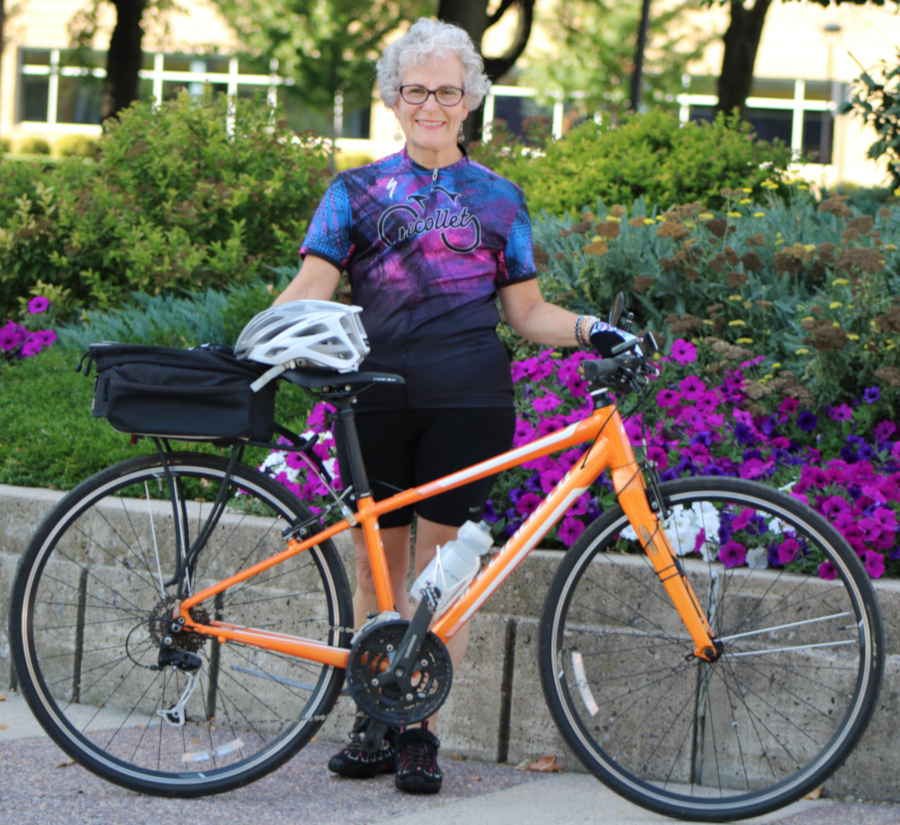Margo Druschel Finds Wisdom in Cancer Journey
October 8, 2019

When Margo Druschel of Mankato went in for her yearly mammogram in September 2018, it was part of her normal healthcare routine. When Mankato Clinic offered her the choice of a 2D or 3D mammogram, she chose 3D as it is proven to detect more breast cancers than conventional 2D mammograms.
“If you do yearly mammograms it’s likely your cancer will be caught sooner and perhaps that will enable your treatment to be less arduous and your life to be longer,” Margo said.
This time, Dr. Steven Haugen saw something on her mammogram that wasn’t there the year before. She returned for more imaging and a biopsy. To get the results, she made an appointment with her primary care provider, Deb Schilling, PA-C.
“I wanted to have this conversation with Deb. I wanted the results delivered by my primary provider with whom I trust and have a relationship,” Margo said.
Deb confirmed it was breast cancer.
“I am fit, healthy, I take care of myself. It definitely felt like a betrayal,” Margo said.
Along the way, Deb gave her the “dreaded” breast cancer book. Margo spent one weekend reading the chapters that pertained to her. “I am very much a learner. I wanted to know as much as I could. It gave me a sense of control.”
After more testing and a breast MRI, she met with Dr. Jeremy Berger, surgeon, and Dr. Suresh Devineni, oncologist, to dig into the results. Margo was grateful for her husband, Steve, who took copious notes. On the electronic wallboard in an exam room, Dr. Berger displayed a digital image of a breast to show where the tumor was. Together, they decided a lumpectomy and removing several lymph nodes was a reasonable path forward.
The lumpectomy results confirmed the lymph nodes were cancer-free, but the cancer was larger than expected and they weren’t able to remove all of it. Margo knew this was a possibility. The diagnosis was revised to lobular carcinoma, a common breast cancer in the areas that produce milk.
“This type of cancer hides and can be difficult to pick up on imaging,” Dr. Berger said. “I felt taking more tissue in a lumpectomy would be disfiguring. I recommended a mastectomy.”
Margo could have a mastectomy of one breast and closely monitor the healthy breast. Due to the elusive nature of her cancer, she decided to remove both breasts. “It was the best way to lower the risk of recurrence without having to worry about constantly monitoring the remaining breast.”
Margo has always been active, swimming, biking, walking. Her breasts were something to be strapped down in a sports bra. She chose not to do reconstruction surgery of her breasts or prosthesis.
“It felt like the best choice for me,” Margo said. “I’m rocking the 12-year-old boy look.”
With a double mastectomy, Dr. Devineni assured her radiation and five years of hormone therapy would not be necessary. Margo was relieved to get a pass on hormone therapy and potential side effects.
“It became such a different journey than the one I was preparing for,” Margo said. “While it’s a devastating diagnosis, it’s not a death sentence.”
She would endure a major surgery, but other than that she felt she had chosen a non-life altering path. She had both breasts removed on November 9. Her daughter was a supportive caregiver who cooked and spent time with her mom during recovery. Sometimes they would knit together. From afar, her son was supportive and he and his wife came at Christmas to visit.
“Margo listened to her care team and understood it’s OK to rest and let others help you until you get your energy back,” Deb Schilling, PA-C said. “She had a few small bumps in the road but her positive attitude and amazing support helped propel her back to her new normal.”
Her husband was by her side all the way. A couple days after her surgery, he helped her shuffle down the Red Jacket Trail. Margo believes her fitness played a major role in her recovery.
“It was a huge benefit because I was able to recover, I think pretty quickly. Being active is something that defines me,” Margo said.
Living Strong
Margo joined LIVESTRONG at the YMCA. In this 12-week fitness program, she was one of nine women who were all breast cancer survivors. The course blended yoga, strength training, nutrition, psychology counseling and physical assessments. She has added weight machine workouts to complement her aerobic workouts. She likes the bone density benefits of strength training.
At age 62, she’s an avid cyclist – pedaling to nowhere in the winter and hitting the roads and trails in the warmer months. She rides her bicycle to work at Minnesota State University, Mankato, where she is an academic advisor. The Druschels ride the 44-mile loop in the Mankato River Ramble every year.
Margo had always eaten healthy – no soda or artificial sweeteners. She ate lots of fresh fruits and veggies. When she was diagnosed with cancer, she upped the organics. She also loves “The Cancer Fighting Kitchen” cookbook she received in her JZ Caring Box.
Margo Druschel celebrated being 6-months cancer free in May. Her treatment plan includes visits to Mankato Clinic every six months to screen for cancer. Deb Schilling, PA-C, showed her how to examine her scars. For decades, Margo had been doing routine breast self-exams, using a card that hangs in her shower, and now she is examining her scars every six weeks.
Margo’s advice to other women: “Get your mammograms. Do your breast self-exams. Take control of your own health in every way that you can.”